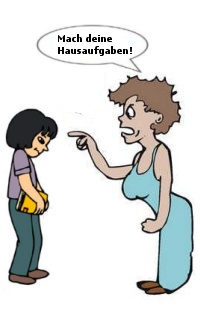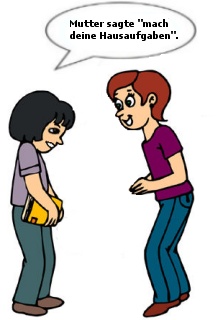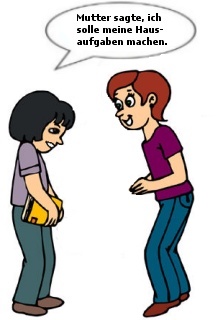

http://www.deutschseite.de
by ![]() Cathy & Tom
Cathy & Tom
last updated:
|
|
|
http://www.deutschseite.de |
|
| |||
learning target |
Aim of this section is to learn how to say / to report what somebody else said before.
| German | English |
| Er sagte, er habe keine Zeit. | He said he had no time. |
rules |
What's the difference between direkte Rede (direct speech) and indirekte Rede (reported speech)?
Direkte Rede is the word by word repetition. The quoted words have to be in quotation marks.
Indirekte Rede is an indirect way of repeating what somebody said.
Usually we don't use the indicative mood for this but the subjuctive mood, more precisely Konjunktiv I.
Using Konjunktiv I allows us to dissociate from the statement. This is for important for example for journalists
who can't and don't want to guarantee for the truth of the statement or don't want to make any judgement.
example:
Direkte Rede |
|
| Indirekte Rede | ||
 |  |
|
|  |  |
Let's analyse the example a bit more in detail.
Joy is using the indicative mood in her statment: Ich habe ...
In the direct speech Kristine reports what Joy said by using the indicative mood as well: Joy sagte, "ich habe ..."
In the indirect speech Kristine reports what Joy said by using the subjuctive mood - Konjunktiv I: Joy sagte, sie habe ... (not: sie hat).
The two possibilities of repeating a statement
There are always two ways to repeat a statement.
Either the second sentence is a main sentence as show above or a subordinate sentence which starts with "dass".
statement | reported speech | reported speech |
Joy: Ich habe einen neuen Job. | Joy sagte, dass sie einen neuen Job habe. | Joy sagte, sie habe einen neuen Job. |
Tina: Ich bin eine Studentin. | Tina sagte, dass sie eine Studentin sei. | Tina sagte, sie sei eine Studentin. |
Andre: Ich gehe ins Bett. | Andre sagte, dass er ins Bett gehe. | Andre sagte, er gehe ins Bett. |
As you see the word order follows the rules we spoke already about in Satzstellung.
In main sentences the main verb is at the second position and in subordinate sentences at the end.
How do you form the Konjunktiv I?
Präsens
To form the Konjunktiv I in the present tense:
|
person | ending | example |
ich | stem + e | habe |
du | stem + est | habest |
er / sie / es | stem + e | habe |
wir | "infinitive" | haben |
ihr | stem + et | habet |
sie | "infinitive" | haben |
As you can see in the table below there is no difference between the indicative
and the subjunctive mood - Konjunktiv I of the ich-, sie- (plural) and wir-form.
The du- and the ihr-form is different from the indicative mood
but this forms are (almost) never used in spoken German and therefor you can forget them.
The questions is: What do you use if there is no difference between indicative
and subjunctive mood or the correct form sounds odd?
The simple answer is, use the Konjunktiv II instead.
person | indicative | Konjunktiv I | Konjunktiv II |
ich | habe | habe -> no difference --> use --> | hätte |
du | hast | habest -> sounds odd --> use --> | hättest |
er/sie/es | hat | habe -> OK | hätte |
wir | haben | haben -> no difference --> use --> | hätten |
ihr | habt | habet -> sounds odd --> use --> | hättet |
sie | haben | haben -> no difference --> use --> | hätten |
examples
These rules have a nice side-effect. The only thing you have to keep in mind
is the er/sie/es-form of Konjunktiv I and you can forget the rest.
exception
The only verb we use the Konjunktiv I for all persons is "sein".
person | indicative | Konjunktiv I | Konjunktiv II |
ich | bin | sei -> OK | wäre |
du | bist | seist -> OK | wärest |
er/sie/es | ist | sei -> OK | wäre |
wir | sind | seien -> OK | wären |
ihr | seid | seiet -> OK | wäret |
sie | sind | seien -> OK | wären |
Perfekt
To form the Konjunktiv I in the perfekt tense:
|
example
person | indicative | Konjunktiv I | Konjunktiv II |
ich | habe gelernt | habe gelernt -> no difference --> use --> | hätte gelernt |
du | hast gelernt | habest gelernt -> sounds odd --> use --> | hättest gelernt |
er/sie/es | hat gelernt | habe gelernt -> OK | hätte gelernt |
wir | haben gelernt | haben gelernt -> no difference --> use --> | hätten gelernt |
ihr | habt gelernt | habet gelernt -> sounds odd --> use --> | hättet gelernt |
sie | haben gelernt | haben gelernt -> no difference --> use --> | hätten gelernt |
Präteritum and Plusquamperfekt
There is no subjunctive mood form for the tenses Präteritum and Plusquamperfekt.
If you want to report a Präteritum or Plusquamperfekt sentesence you have to do it in the same
way you did it for the Perfekt tense.
example 1
example 2
Zukunft (Futur I)
To form the Konjunktiv I in the future tense:
|
example
person | indicative | Konjunktiv I | Konjunktiv II |
ich | werde schreiben | werde schreiben -> no difference --> use --> | würde schreiben * |
du | wirst schreiben | werdest schreiben -> sounds odd --> use --> | würdest schreiben * |
er/sie/es | wird schreiben | werde schreiben -> OK | würde schreiben * |
wir | werden schreiben | werden schreiben -> no difference --> use --> | würden schreiben * |
ihr | werdet schreiben | werdet schreiben -> sounds odd --> use --> | würdet schreiben * |
sie | werden schreiben | werden schreiben -> no difference --> use --> | würden schreiben * |
* This is not the "real" Konjunktiv II of schreiben. For ich it would be "ich schriebe".
As I explained already here we hardly use the "real" Konjunktiv II".
For almost all verbs we use the "würden-Konjunktiv II" instead.
Modalverben
To repeat a sentence containing a modal verb:
|
example
person | indicative | Konjunktiv I | Konjunktiv II |
ich | muss gehen | müsse gehen -> OK | müsste gehen |
du | musst gehen | müssest gehen -> sounds odd --> use --> | müsstest gehen |
er/sie/es | muss gehen | müsse gehen -> OK | müsste gehen |
wir | müssen gehen | müssen gehen -> no difference --> use --> | müssten gehen |
ihr | müsst gehen | müsset gehen -> sounds odd --> use --> | müsstet gehen |
sie | müssen gehen | müssen gehen -> no difference --> use --> | müssten gehen |
All modal verbs
As you can see we only need the ich- and er/sie/es-form and they are the same.
modal verb | Konjunktiv I (ich - form) | Konjunktiv I (er/sie/es - form) |
müssen | müsse | müsse |
wollen | wolle | wolle |
sollen | solle | solle |
können | könne | könne |
dürfen | dürfe | dürfe |
mögen | möge | möge |
Questions
Direkte Rede |
|
| Indirekte Rede | ||
 |  |
|
|  |  |
There are two types of questions we can repeat:
examples for decision-questions
Repeating a decision-question:
|
examples for W-questions
Repeating a W-question:
|
hint Consider that you don't put a question mark in the reported speech of questions!
Imperative
There is no direct way of transforming an indicative imperative sentence into an subjuctive imperative sentence.
If we want to report a command / request, somebody else made, we use two "substitute verbs": sollen or mögen.
Sollen is used to repeat strict commands or requests.
Mögen is used ro repeat a polite asking or request.
example 1
Direkte Rede |
|
| Indirekte Rede | ||
 |  |
|
|  |  |
To repeat an imperative sentence
|
example 2
indicative sentence (strict command): Geh raus! (Go out!)
person | indicative | Konjunktiv I | Konjunktiv II |
ich | soll gehen | solle gehen -> OK | sollte gehen |
du | sollst gehen | sollest gehen -> sounds odd --> use --> | solltest gehen |
er/sie/es | soll gehen | solle gehen -> OK | sollte gehen |
wir | sollen gehen | sollen gehen -> no difference --> use --> | sollten gehen |
ihr | sollt gehen | sollet gehen -> sounds odd --> use --> | solltet gehen |
sie | sollen gehen | sollen gehen -> no difference --> use --> | sollten gehen |
example 3
indicative sentence (polite request): Hol bitte ein Cola. (Please fetch a cola.)
person | indicative | Konjunktiv I | Konjunktiv II |
ich | mag holen | möge holen --> sounds odd --> use --> | möchte holen |
du | magst holen | mögest holen -> sounds odd --> use --> | möchtest holen |
er/sie/es | mag holen | möge holen -> OK | möchte holen |
wir | mögen holen | mögen holen -> no difference --> use --> | möchten holen |
ihr | mögt holen | möget holen -> sounds odd --> use --> | möchtet holen |
sie | mögen holen | mögen holen -> no difference --> use --> | möchten holen |
Introducing verbs
To report what somebody else said we need an introducing sentence like: He said, ...
Here are further verbs you can use.
A last hint
At the end of the topic I want to go back to our first example.
If you didn't get confused yet you will be now.
What we learned so far about Indirekte Rede was all grammatically correct.
There are, however, other ways of repeating statements which allows to express our doubt on different levels.
These ways are maybe grammatically not 100% correct but used in German too.
example
Joy: Ich habe einen neuen Job.
used mood | reported speech | level of doubt |
Indikativ | Joy sagte, sie hat einen neuen Job. | You have no doubt about this statement. |
Konjunktiv I | Joy sagte, sie habe einen neuen Job. | You don't know if it's true. |
Konjunktiv II | Joy sagte, sie hätte einen neuen Job. | You are unsure if it's true. |
Konjunktiv II | Joy sagte, sie hätte angeblich einen neuen Job. | You are quite sure it's not true. |
* angeblich = allegedly / supposedly
exercises |
| |||||
| |||||
| |||||
| |||||
| |||||
summary - documents for your folder |
indirekte Rede (theory, 10 pages) |
| ||